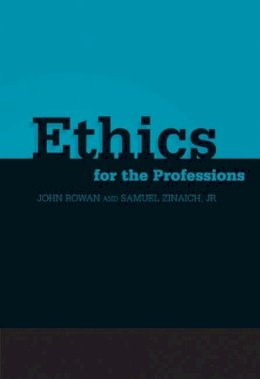
Stock image for illustration purposes only - book cover, edition or condition may vary.
Ethics for the Professions
Zinaich, Samuel, Jr.; Rowan, John
€ 146.97
FREE Delivery in Ireland
Description for Ethics for the Professions
paperback. Ethics stem from the concepts of role-related obligations and moral vision, per Rowan and Zinaich (Purdue U. Calumet.) In the initial scan across professions, contributors in 51 reprinted papers discuss moral theories, perspectives on professional ethics, employee rights (including a call to focus o Num Pages: 464 pages. BIC Classification: HPQ; KJG. Category: (G) General (US: Trade); (P) Professional & Vocational; (U) Tertiary Education (US: College). Dimension: 235 x 189 x 23. Weight in Grams: 771.
This new text provides students with the tools necessary to make ethically sound decisions in the professions they choose for themselves. The text combines lucid explanations of leading philosophical moral theories with detailed discussion of how those theories are to be applied. Each chapter concludes with short cases and questions to engage students in solving perplexing professional ethics issues.
This new text provides students with the tools necessary to make ethically sound decisions in the professions they choose for themselves. The text combines lucid explanations of leading philosophical moral theories with detailed discussion of how those theories are to be applied. Each chapter concludes with short cases and questions to engage students in solving perplexing professional ethics issues.
Product Details
Format
Paperback
Publication date
2002
Publisher
Wadsworth Publishing United States
Number of pages
464
Condition
New
Number of Pages
464
Place of Publication
Belmont, CA, United States
ISBN
9780155069992
SKU
V9780155069992
Shipping Time
Usually ships in 15 to 20 working days
Ref
99-2
Reviews for Ethics for the Professions
Part 1: ACROSS THE PROFESSIONS. 1. Moral Theory. 2. Perspectives on Professional Ethics. Michael D. Bayles, What Is a Profession? Michael Davis, Professional Responsibility: Just Following the Rules? John-Christian Smith, Strong Separatism in Professional Ethics. Don Welch, Just Another Day at the Office: The Ordinariness of Professional Ethics. Banks McDowell, The Excuses That Make Professional Ethics Irrelevant. 3. Professional-Employee Relations. ... Read more
